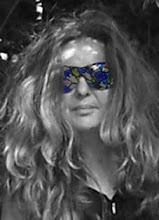
El iceberg imaginario
"Es mejor tener el iceberg que el barco,
aunque ello signifique el fin del viaje.
Aunque permanezca totalmente inmóvil como una nublada roca
y todo el mar fuera móvil mármol.
Es mejor tener el iceberg que el barco;
poseeríamos más bien esta llanura de nieve
aunque las velas del barco anduvieran por el mar
como la nieve yace no disuelta sobre el agua.
Oh, solemne y flotante campo,
¿Te das cuenta que un iceberg reposa
contigo y cuando despierte puede pacer en sus nieves?
Esta es una escena por la que un marino daría sus ojos.
El barco es ignorado. El iceberg se alza
y se hunde de nuevo; sus vítreas puntas
corrigen las elipses del cielo.
Esta es una escena donde quien pasea por la borda
es incultamente retórico. El telón
es demasiado ligero para alzarse en las más finas cuerdas
que las aéreas torsiones de la nieve provean.
La gracia de estos blancos picos
hace sombras con el sol. El iceberg desafía su peso
sobre un movedizo escenario y se está y observa.
El iceberg corta sus facetas desde dentro.
Como las joyas de una tumba
continuamente se protege y adorna
sólo él mismo, quizás las nieves
que tanto nos sorprenden flotando en el mar.
Adiós, decimos, adiós, el barco se pierde
adonde las olas se entregan a otras olas
y las nubes pasan a un cielo más cálido.
Los iceberg son necesarios al alma
(haciéndose ambos de los elementos menos visibles)
para verlos así: encarnados, bellos, indivisiblemente erigidos. "
The imaginary iceberg
We'd rather have the iceberg than the ship,
although it meant the end of travel.
Although it stood stock-still like cloudy rock
and all the sea were moving marble.
We'd rather have the iceberg than the ship;
we'd rather own this breathing plain of snow
though the ship's sails were laid upon the sea
as the snow lies undissolved upon the water.
O solemn, floating field,
are you aware an iceberg takes repose
with you, and when it wakes may pasture on your snows?
This is a scene a sailor'd give his eyes for.
The ship's ignored. The iceberg rises
and sinks again; its glassy pinnacles
correct elliptics in the sky.
This is a scene where he who treads the boards
is artlessly rhetorical. The curtain
is light enough to rise on finest ropes
that airy twists of snow provide.
The wits of these white peaks
spar with the sun. Its weight the iceberg dares
upon a shifting stage and stands and stares.
The iceberg cuts its facets from within.
Like jewelry from a grave
it saves itself perpetually and adorns
only itself, perhaps the snows
which so surprise us lying on the sea.
Good-bye, we say, good-bye, the ship steers off
where waves give in to one another's waves
and clouds run in a warmer sky.
Icebergs behoove the soul
(both being self-made from elements least visible)
to see them so: fleshed, fair, erected indivisible.
EDGAR ALLAN POE & LA ROCOLA
Rutilante en el cuarto oscurecido azul como el gas
se consume la rocola; cae la música: azul como la pupila
Starlight, La Conga, todos los bailes de un ciego
en la cuadra de los bares,
oquedades en nuestra menguante luna,
adornados de botellas y luces azules
y conchas y cocos platinados.
Tan suavemente como cae la música,
caen las monedas por la ranura,
los tragos, como solitarias cataratas,
bajan nocturnos por gargantas separadas
y las manos se cubren mutuamente
en la oscura oscuridad bajo
los manteles y todo se hunde,
se hunde y cae– tal como imaginamos
la impotente caída del amor hacia la tierra,
cayendo de la cabeza y el ojo
hasta las manos y el corazón, y más aún.
La música simula llorar y reir,
mientras se rebaja al trago y al crimen.
La ardiente caja puede marcar el compás,
invariable, siempre, y los tiempos fuertes.
Poe dijo que la poesía era exacta.
Pero los placeres son mecánicos
y saben de antemano lo que buscan
y saben exactamente lo que buscan.
¿Es que pueden lograr el efecto singular
que puede ser medido como el alcohol
o la respuesta a la moneda?
–¿hasta cuándo, pues, arde la música?
¿como la poesía, o todo tu espanto
exacto a medias?
Versión de Jorge Capriata
EDGAR ALLAN POE & THE JUKE-BOX
Easy through the darkened room blue as grass,
The juke-box burns; the music falls, blue as the pupil
Starlight, La Conga, all the dance halls of a blind man´s eye
In the block of honky-tonks,
cavities in our waning moon,
strung with bottles and blue lights
and sivered coconuts and conches.
As easily as the music falls,
the nickels fall into the slots,
the drinks like lonely water-falls
in night descend the separate throats,
and the hands fall on one another
down darker darkness under
the tablecloths and all descends,
descends, falls – much as we envision
the helpless earthward fall of love
descending from the head and eye
down to the hands and heart, and down.
The music pretends to laugh and weep
While it descends to drink and murder.
The burning box can keep the measure
strict, always, and the down-beat.
Poe said that poetry was exact.
But pleasures are mechanical
and know beforehand what they want
and know exactly what they want.
Do the obtain that single effect
That can be calculated like alcohol
or like the response to the nickel
–just how long does the music burn
like poetry, or all your horror
half as exact as horror here?
Elizabeth Bishop(Worcester,1911-Boston,1979)






















No hay comentarios:
Publicar un comentario